With Palestine recognition threats, frustrated allies try to get Netanyahu to listen
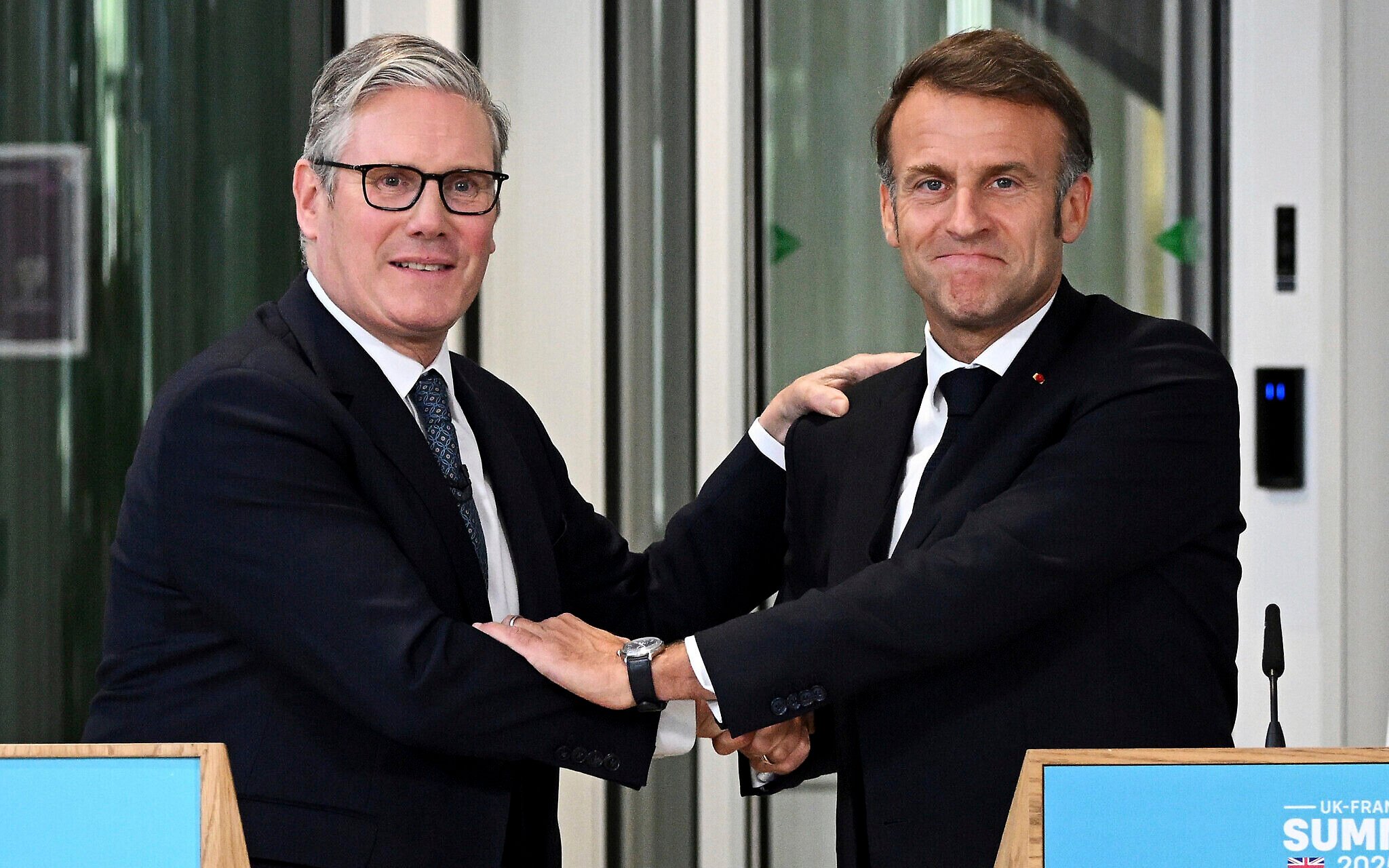
Prime Minister Benjamin Netanyahu prides himself on his diplomatic acumen. One of the most experienced leaders on the world stage, he has weathered challenging Democratic administrations and managed to return to US President Donald Trump’s good graces after a crisis in ties, signed normalization deals with Arab states and found new allies across the globe.
Yet he was outmaneuvered diplomatically in recent months by a generally weak and ineffective leader, the sclerotic Palestinian Authority President Mahmoud Abbas, the effects of which we are now witnessing.
In April, French President Emmanuel Macron announced that he might recognize a Palestinian state “in the coming months,” in the lead-up to a United Nations conference in June co-hosted with Saudi Arabia on the issue.
Ahead of the conference — which was eventually postponed to this week because of Israel’s aerial campaign against Iran — Abbas penned a letter to Macron and Saudi Crown Prince Mohammed bin Salman outlining the main steps he thinks must be taken to end the war in the Gaza Strip and achieve peace in the Middle East.
“Hamas will no longer rule Gaza and must hand over its weapons and military capabilities to the Palestinian Security Forces,” wrote Abbas.
He said he was “ready to invite Arab and international forces to be deployed as part of a stabilization/protection mission with a (UN) Security Council mandate.”
“We are ready to conclude within a clear and binding timeline, and with international support, supervision and guarantees, a peace agreement that ends the Israeli occupation and resolves all outstanding and final status issues,” Abbas wrote.
“Hamas has to immediately release all hostages and captives,” he added.
Abbas reaffirmed his commitment to reform the Palestinian Authority and confirmed his intention to hold presidential and general elections “within a year” under international auspices.
“The Palestinian State should be the sole provider of security on its territory, but has no intention to be a militarized State.”
Macron, clearly impressed, called the letter “a decisive moment.”
I received a letter of hope, courage, and clarity.
The President of the Palestinian Authority, Mahmoud Abbas, charts a course toward a horizon of peace.
A condemnation of terrorism, the release of hostages, the demilitarization of Hamas, an end to the war in Gaza,… pic.twitter.com/zQ2ZgEOQ5k
— Emmanuel Macron (@EmmanuelMacron) June 12, 2025
In his July 24 letter to Abbas announcing his decision to soon recognize a Palestinian state, Macron cited the PA leader’s missive and the commitments therein as the impetus for the move.
Netanyahu, on the other hand, only pushed Macron further toward such recognition, against Israel’s will and over its head. He let the humanitarian situation in Gaza, and the narrative around it, get out of hand.
He also failed to enforce Israeli law against Jewish extremists in the West Bank, who killed Palestinian civilians and set fires near the ruins of an important 5th-century church.
Palestinians carry humanitarian aid in Rafah, in the southern Gaza Strip, July 31, 2025. (Abed Rahim Khatib/Flash90)
And it seems no one at the top had the foresight to sit with IDF commanders to ensure that tactical units would figure out how they can protect themselves without firing live ammunition against crowds of Gazan civilians trying to get to aid sites, and to ensure that sufficient measures were in place to avoid firing near the only Catholic church in the Strip. An Israeli tank shell struck the roof of the Holy Family Church earlier this month, killing three civilians and wounding the priest.
The French are particularly sensitive to the fate of Catholics in the Holy Land. For four centuries, France enjoyed a special status as protector of Christian traders and priests. It lost its status after World War I, but maintains four “national domains” in Israel and asserts its historic role whenever it sees an opportunity.
Israel offered it one, and that French decision opened the floodgates.
Following on from Macron, British Prime Minister Keir Starmer announced on Tuesday that the UK would also recognize a Palestinian state in September unless the Israeli government takes substantive steps to end the war and humanitarian crisis in Gaza and meets several other conditions, including recommitting to a viable peace process.
More Western countries quickly said they were considering the move as well — Andorra, Australia, Canada, Finland, Luxembourg, New Zealand, Portugal, San Marino, and Malta.
“I wouldn’t call it a tsunami yet,” said Maya Sion-Tzidkiyahu, an expert on Israel-Europe relations at the Mitvim Institute on Wednesday. “But we are standing on the edge of the abyss.”
The ground crumbles
Hours later, Israel slipped further toward the diplomatic void.
Prime Minister Mark Carney announced that Canada, another member of the G7 forum of leading global economies, will recognize a Palestinian state in September.
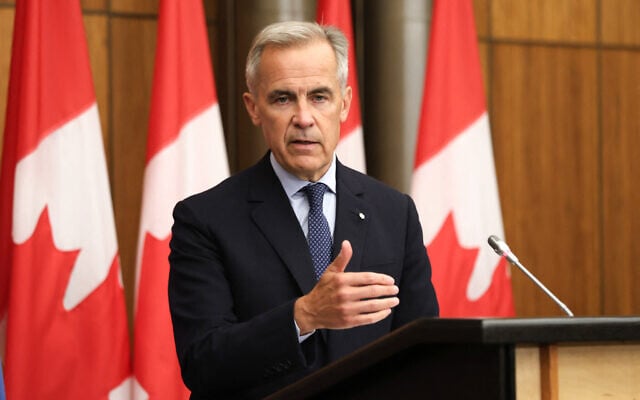
Canadian Prime Minister Mark Carney speaks during a press conference after a cabinet meeting to discuss trade negotiations with the US and the situation in the Middle East, at the National Press Theatre in Ottawa, Ontario, Canada, on July 30, 2025. (Dave Chan/AFP)
For now, other important countries like Australia and New Zealand have affirmed their “unwavering commitment to the vision of the two-state solution,” a vague and non-binding declaration.
Germany, one of Israel’s closest allies, said it “does not plan to recognize a Palestinian state in the short term.” Italian Prime Minister Giorgia Meloni said the move would be “counterproductive.”
The remaining Western holdouts are being cautious, and with good reason.
“It’s a card that can only be played once,” said Rémi Daniel, head of the Europe research program at the Institute for National Security Studies in Tel Aviv.
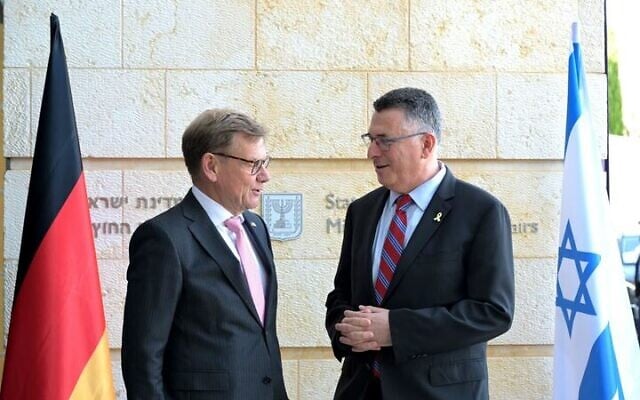
German Foreign Minister Johann Wadephul (L) poses for a photo with his Israeli counterpart Gideon Sa’ar ahead of a meeting at the Foreign Ministry in Jerusalem, on July 31, 2025. (Shlomi Amsalem/GPO)
“I do think there is still a desire among leaders not to go too far against Israel,” Daniel noted.
They also have to weigh the risk they are willing to assume by recognizing a state of Palestine, with analysts saying the move could backfire by exposing the ineffectiveness of the move.
“If in the end the feeling is that international recognition by a country like France or Britain doesn’t change anything, doesn’t affect anything, it’s actually proof and an illustration of the weakness of those countries,” said Daniel. “That’s why I think leaders are considering it because they don’t want to get into an embarrassing situation.”
“They’re ineffective, they’re pathetic, and they’re tragic,” Michael Oren, former Israeli ambassador to the United States, said of the announcements, noting that “over 140 countries have already recognized the Palestinian state, and it’s done nothing for the Palestinian state.”
“These are countries that used to have a voice, a serious voice, in international affairs,” Oren continued. “They no longer do. And it actually shows their weakness. It shows they’re irrelevant.”
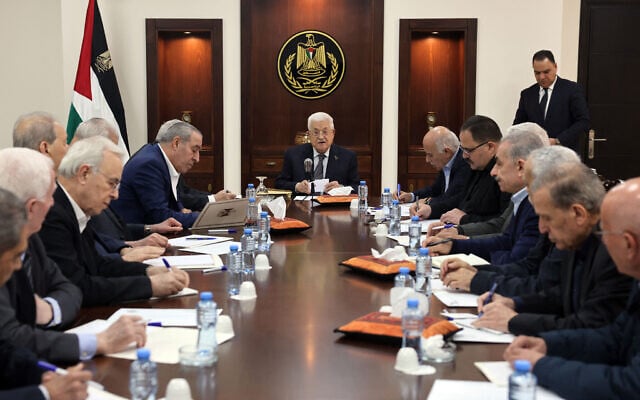
A handout picture provided by the Palestinian Authority’s press office (PPO) shows PA President Mahmoud Abbas chairing a meeting of the Fatah Central Committee, in Ramallah, on February 19, 2025. (Thaer GHANEM / PPO / AFP)
“Everyone knows that the Palestinians had a de facto state in Gaza,” an Israeli official told The Times of Israel. “They had a de facto state in Gaza since August 2005. It enabled the October 7, 2023, atrocities, the slaughter of 1,200 innocent people, and the abduction of another 251 innocent people into the Hamas dungeons of Gaza. Well, the French leader can bow to terror again, but for Israel, never again is now.”
The Western leaders acknowledge there won’t be a Palestinian state any time soon, but they are eager to find ways to send a message to the current Israeli government.
“They understand that it’s just a rhetorical statement,” said Emmanuel Nahshon, former ambassador to Belgium and Foreign Ministry deputy director-general for public diplomacy, “but it’s meant first and foremost at the Israeli government in order to show displeasure and disapproval of the actions of the Israeli government not only in Gaza, but also the free hand given to extreme settlers in the West Bank.”
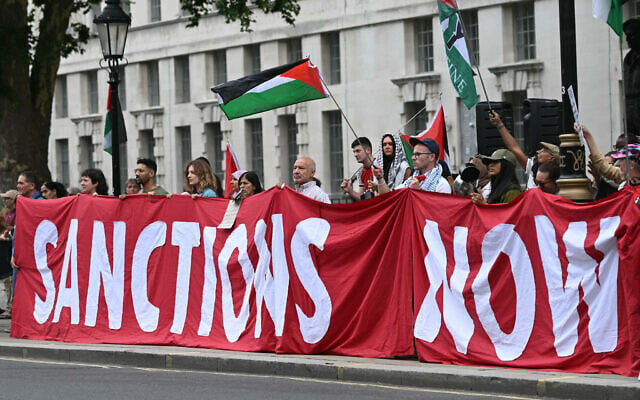
Protesters hold a banner calling for sanctions to be placed on Israel during a demonstration in support of Palestinians in Gaza amid fears of starvation in the war-torn territory outside Downing Street in London on July 29, 2025. (JUSTIN TALLIS / AFP)
And, of course, domestic politics can never be overlooked in a democracy.
“It’s an internal Labour party matter,” argued British Conservative MP Bob Blackman, speaking from the Gaza border during a visit with the European Leadership Network. “Huge pressure has been put on the prime minister to recognize the state of Palestine. The messages and the media that we see in the UK are full of the problems of starvation in Gaza, and that’s piling the pressure on [Starmer] to take action.”
“You see the Muslim Brotherhood riots in their city centers and on their campuses,” said the Israeli official. “You also know who finances the campaigns. That’s the story. Their statements have little to do with foreign policy and a lot to do with their domestic issues.”
Palestinian independence day?
Yet, driven by internal political calculations and a desire to impose consequences on Netanyahu, Western leaders could make it harder to end the war in Gaza by emboldening Hamas.
Starmer, rather bizarrely, said that Israel could forestall UK recognition by reaching a ceasefire in Gaza. Hamas would now be getting in the way of recognition if it agrees to a truce before September.

Members of Hamas’s armed wing, the Ezzedine al-Qassam Brigades, take part in a military parade along a street in Deir al-Balah, in the central Gaza Strip, on January 19, 2025. (BASHAR TALEB / AFP)
“The UK and other nations put out statements trying to put pressure on Israel, which hardened Hamas’s position,” said Blackman. “What this has done is basically say to Hamas, ‘Well, if you just keep holding out, holding out, holding out, we’ll recognize the state of Palestine.’ Hamas ends up with a Palestinian state, no requirement to release the hostages, and indeed, rewarding the treacherous acts of terrorism they inflicted on the people of Israel.”
Moreover, Hamas has paid attention throughout the war to international pressure on Israel. When it seems that Western allies are forcing concessions from Israel with nothing demanded from Hamas, the terror group sits back and watches its negotiating position improve while Israel’s slips.
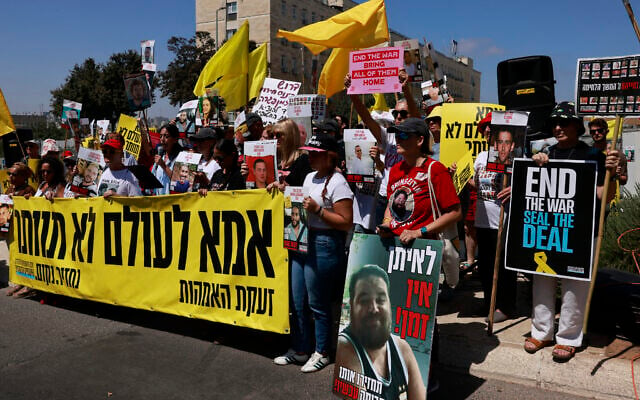
Families and supporters of Israelis held hostage in Gaza since October 7, 2023, hold a protest calling for action to secure their release outside the prime minister’s office in Jerusalem on July 31, 2025. (Menahem KAHANA / AFP)
Hamas didn’t agree to a truce even when international pressure was mounting against it in recent weeks. It certainly won’t now as Israel takes more blows with each passing day.
And though the countries announcing plans to recognize a Palestinian state are convinced they are strengthening the Palestinian Authority, Hamas has a much better case to make now to the Palestinian street that, despite the costs, only violence against Israel can lead to progress on statehood, and ultimately Israel’s destruction. Many could well treat the October 7 slaughter as Palestine’s independence day.

